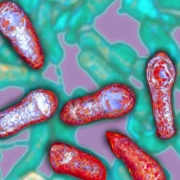Male Infertility: Are Lower Sperm Counts Creating An Existential Crisis?
Throughout the ages, women have carried the burden and shame of infertility. But in recent years, scientific analysis has created a gender equity of sorts when it comes to conception. Research suggests that lower sperm counts in men are contributing significantly to rising infertility rates.
A 2020 research review published in Current Opinion in Urology stated, “Recent high-quality studies have demonstrated that there is indeed a decline in sperm parameters.”
And according to a 2021 review in the Lancet, there is indeed infertility gender equality. “It is estimated that infertility affects 8-12% of couples globally, with a male factor being a primary or contributing cause in approximately 50% of couples.”
But how exactly this decline in sperm counts impacts fertility isn’t yet fully understood, according to the review in Current Opinion in Urology. “As such, further studies are necessary to evaluate whether this decline in sperm count correlates with decreased fecundity and how to identify and mitigate potential causative factors.”
Although there may not be clear-cut causation between low sperm counts and male infertility, there is correlation. So what are the possible root causes of declining sperm counts and motility? Let’s first address the basics….
What is Male Infertility?
On a basic level, Johns Hopkins University explains that male infertility means a man is not able to start a pregnancy with his female partner. The causes of it, according to Hopkins, include low sperm counts or not having enough healthy sperm.
“Motility” describes the ability and strength of sperm to “swim” through the female reproductive tract without dying before reaching the egg. Like a 1500m Olympic swimmer, sperm quality is not just about speed. Fertility depends on spermatozoal strength as well as endurance.
On a technical level, adequate sperm motility is defined as sperm with forwarding progression (the equivalent of swimming strokes) of at least 25 micrometers per second.
Signs of Possible Low Fertility in Men?
Are there tell-tale signs of male infertility before submitting a sperm sample for analysis? Some indications mirror the signs of low testosterone, including a lack of libido or the inability to get or maintain an erection. In addition, a small volume of ejaculate or difficulty ejaculating could spell problems trying to conceive.
According to the Mayo Clinic, there’s a possible symptom of male infertility that’s been in the spotlight because of the Covid pandemic: loss of smell, although it is not clear what the connection is.
Other indications that fertility could be compromised include gynecomastia (abnormal breast tissue growth in men) and decreased facial hair.
Clinical Assessment of Male Infertility
The aforementioned Lancet review says that “semen analysis remains the cornerstone for evaluating male infertility.”
At what point is sperm count considered low?
According to Mayo Clinic, a lower than normal sperm count is fewer than 15 million sperm per milliliter of semen or a total sperm count of less than 39 million per ejaculate.
But thanks to advances in diagnostic testing, men can have the quality and function of their sperm analyzed from the comfort of home. There are tests that can be delivered to the home, and after shipping the sperm sample, a lab company will evaluate key markers of sperm health, including:
- Volume of semen
- Sperm count (in the semen sample)
- Sperm concentration (how many sperm per milliliter of semen)
- Motility (the percentage of sperm “swimming”)
- Morphology (proper sperm size and shape)
Another way to assess male infertility is through exosome testing. A 2019 study in Advances in Clinical Chemistry explains that exosomes are nanosized membrane vesicles secreted by a wide variety of cells and found in abundance in biological fluids including semen. The proteins in exosomes “play an indispensable role in the maturation of spermatozoa and therefore, serve as an excellent biomarker in early diagnosis of male infertility,” the study co-authors conclude.
Hormone testing can also reveal signs of male infertility. Low levels of follicle-stimulating hormone (FSH) and testosterone may indicate male infertility. In addition to these two hormones, hormone testing may show that certain men can have abnormally-high levels of female sex hormones, including estrogen.
What Are The Root Causes Of Male Infertility?
According to Johns Hopkins, the problem may be genetic. Or there may be a blockage in the urinal/genital tract. Previous infections or an injury to the groin may also be factors. Over the last couple of years or so, more researchers are trying to determine what is causing the purported reduction in lower sperm counts.
The previously mentioned review in “Current Opinion in Urology” says that according to several studies, the possible links for this decline in sperm count include obesity, diet, and environmental toxins.
In one study published by the Bulletin of the World Health Organization, 186 couples who were unable to conceive were examined. According to the researchers, the most frequent cause of male infertility was inflammatory disease of male accessory glands, at nearly 13%. Male accessory glands include the seminal vesicles, the prostate gland, and the bulbourethral glands. As the National Institutes of Health’s National Cancer Institute explains, these glands secrete fluids that enter the urethra. In nearly 30% of the 186 cases of male infertility, either a lack of sperm (azoospermia) or high levels of follicle-stimulating hormone was the culprit. In nearly 9% of the cases, a mass of varicose veins in the spermatic cord (varicocele) was the underlying factor.
Modern Stressors That May Be Causing Male Infertility
The stress caused by the global health crisis of the last two-plus years will certainly not help reverse the tide of reported low sperm counts. In addition to chronic stress, environmental pollution may be a contributing factor. For example, a class of synthetic chemicals known as PFAS, which are called “forever chemicals” because they take decades to break down in the environment, has been linked to lower sperm counts, says a report by Michigan Public Radio.
To make matters worse, PFOA and PFOS, two specific “forever” chemicals, can cause smaller penis size. PFAS chemicals are ubiquitous in fast food wrappers, private drinking wells, non-stick cookware, and other products.
Synthetic chemicals found in everyday commercial household cleaners and detergents disrupt the body’s natural hormone-producing ability. These “endocrine disruptors” may cause an imbalance of sex hormones that may negatively impact the ability to conceive. Other examples of environmental stressors that may affect male infertility include toxic mold and excessive electromagnetic frequencies (EMFs).

Ways To Improve Male Infertility
There’s the conventional approach, which includes surgery and medicine. But for more natural ways to boost fertility, consider lightening your toxic load by using cleaners, hair- and skin-care products, and laundry products that are free of synthetic chemicals. Also minimize your exposure to chemicals in plastics, such as the endocrine-disruptor, BPA.
If you are particularly sensitive to EMFs, including Wifi and electric smart meters, consider purchasing a set of EMF blockers.
Do you have a recurring sinus infection or other chronic issues? The stress caused by an infection may cause low sperm counts or poor motility. Work with an integrative doctor to get any lingering infections cleared out.
If you have a high level of stress, make sure you are practicing stress-management techniques throughout the day. Use a smartphone app to do a 5-10 minute deep breathing or meditation session when you wake up, once during the workday, and before going to sleep.
At Innovative Medicine, we offer holistic solutions to help you improve your chances of fertility, including chelation therapy, which helps remove toxic heavy metals from the body.
Conclusion
There is good news when it comes to male infertility. Some articles, such as this one in Harvard University’s Gazette, contend that reports of declining sperm count may be exaggerated. If you have been diagnosed with male infertility, there is light at the end of the fallopian tube. Innovative Medicine offers a full spectrum of therapeutic options that integrates the best of alternative and conventional medicine.
Disclaimer: The statements made in this article have not been evaluated by the Food and Drug Administration. Any products or treatments mentioned are not intended to diagnose, treat, cure, or prevent any disease. Please consult a licensed medical practitioner for medical advice.
At Innovative Medicine, we believe in transparency. We want you to know that we may participate in affiliate advertising programs pertaining to products mentioned herein.
See how we can help you restore complete health of body, mind & spirit.
Join our mailing list and receive exclusive offers + information!







Leave a Reply
Want to join the discussion?Feel free to contribute!